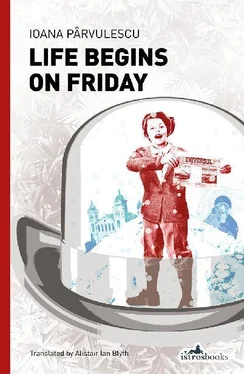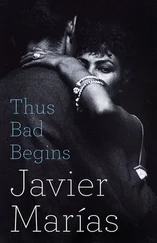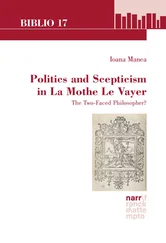‘Perhaps it was a case of mystical aspiration,’ said the doctor, and Agatha added: ‘A kind of prayer.’
But Costache was certain that the ‘syndromes’ said otherwise. Once, the policeman and her husband had amused themselves finding similarities between their professions, and they had discovered them in droves. Both professions demanded a spirit of observation, a warm heart and a clear head, generosity and dedication, tact and courage. Both required discretion and stamina. Both entailed investigations, since in today’s medicine, explained Leon, questioning is obligatory. The answers had to be interpreted: the sick, the same as malefactors, avoid telling the truth. Both professions examined signs with the greatest attention. In both there was need for strong moral fibre and love of one’s fellow man. Both the physician and the policeman had to be educated and intelligent, capable of understanding the subtlest bodily, spiritual and social mechanisms. Both the physician and the policeman had to have money, the first for instruments and hospitals and the second in order not to be corrupted. Here, Costache was better off than Agatha’s husband: he was from a wealthy family and to him his remuneration was mostly symbolic. You could not become Chief of Police if you were not from a wealthy family, and the reason for that was not only to prevent you being bought but also to ensure you had the education required for such a difficult profession. But above all else, both the physician and the policeman were afraid of the spread of evil and tried to quash it. Perhaps in the society of the future, after man makes progress in all the areas expected of him, there will be no need for either physicians or policemen. They had often said as much, but they were among the few who did not believe it. For, they knew that man, wherever he might be in space or time, was in essence the same. For Agatha, Leon Margulis and Costache Boerescu also had one more thing in common: both of them had fallen in love with her. And it was not the stronger that won.
Still lingering in bed and somewhat drained of strength, Agatha thought of the words she had learned from Costache: in her mind, light and Holy Mother could only be connected to the final moment. But Popescu ? A priest ( popă ) or the descendent of a priest… But why had the boy uttered the name? A Popescu must be found, the Popescu with whom the poor child was acquainted. Thinking of his mother’s grief, Agatha wandered down an evil path, a path she almost never allowed herself to follow. Neither Iulia nor Jacques knew that they had had a little sister, born before them, but younger than them, because she had died of meningitis just a few days before her third birthday. She had been unutterably charming, good and happy, until she fell ill. Never in her life had Agatha fought harder for something than she had then. She felt in the most tangible possible way that she was wrestling with death, as she sat by her little girl’s bedside day and night. She had talked to her, although the girl could not hear, she had caressed her, she had called to her, she had smothered her little hands in kisses, she had followed to the letter the instructions as to the doses of medicine and everything she had to do to make her well, and she had prayed unceasingly. She had sensed that the doctor-father no longer believed in the possibility of salvation, but she had believed and fought. But Death had been stronger than the mother; Death is always stronger. And Agatha had wanted to follow her daughter immediately, to help her. How could she leave her alone in the darkness? She had always been protected by her mother, by her father, by a night-light next to her bed. It is impossible to speak of what came next, she was in hell, day after day in hell: of that she was sure. What had she done wrong? Why was the child guilty if she was at fault? Did God exist, if he could permit such a thing? Was not the world itself at fault, from its very foundations? Maybe we are living in an imperfect world, a world abandoned to the whim of fate. The doctor-father had to give her injections, to make her sleep for days on end, because when she awoke, she immediately wanted to follow her little girl, demanding a double dose of morphine to make her sleep forever. Since then, the lamp on her little girl’s grave had never gone out, she had made sure of it, during her frequent trips, on which none of the children were allowed to accompany her.
She spoke to her constantly and told her: if you are in heaven, be happy, there, in heaven, however unhappy we are here, and if you are not there yet, then I, with my own hand, will take you up above, hold on tight, I won’t let you go. And Agatha would clench her fist, grasping thin air. And if there be no heaven, I will make one for you, and if there be no God, you shall have one, your Mama promises. And Agatha could see God plainly and in His arms rested her little girl. And if you are nothingness, then I will love that nothingness and soak it with my tears and protect it with all my being. Do you hear me, nothingness? I love you! You are my nothingness now, my only nothingness. And the nothingness had her eyes. If you feel poorly, I will stand in for you, so that I will be poorly, but no, you could not feel poorly, I give you all the good I have. If you need us, call us, we will come, we hear you. I will come straight away, send me word! For me death was like pregnancy, but in reverse. I counted the days, I spoke to the departed child, just as then I had spoken with the child who had not yet arrived, I explained to it, I consoled it, I protected the child that was no longer, just as I had protected the one that had not yet come. Except that one was drawing nearer to life, while the other was moving farther away from it.
Agatha always kept the ears of her soul pricked up, to hear whether her little girl needed help. And never could she be fully happy again, as she had been before. And not a day passed but in her mind she kissed her on her little head, on her cheek, and when she kissed Iulia, who had come into the world soon thereafter, on her dark hair, she hoped the kiss would also reach the blonde hair of the other girl. The children sensed something; they sensed that they could never make their mother fully happy, there was always a little corner of her that remained discontented and sad.
And when the trial with Jacques had come, Agatha was no longer able to experience even that as a normal mother would have experienced it. As ever, she reined in her thoughts, toiling with desperation. That was her salvation and, strangely, she also seemed to find salvation in the chatter of the servants and women’s affairs, which shifted her thoughts to more concrete things. And Costache’s visits also did her good, and his concern, which had still not flagged after such a bitterly long time. Now Costache sometimes seemed to view Iulia as he had once viewed her. She was not surprised; she knew that he could see the inner person more clearly than Roentgen’s miraculous rays. But nevertheless, Agatha did not like to see him too much in Iulia’s company.
She would now have to inspect all the cleaning that had been done in her absence, to see to the kitchen, the potted plants, to make ready the lamps and candlesticks, to take out and check the crockery for special occasions, to examine the towels in the toilet cabinets next to the bedroom, to make sure they were fresh, to scrub the basins and the porcelain bowls, to remember to send for a piano tuner, because Iulia had asked for one to come, to arrange the things in the larder, to remove the cobwebs that had caught her eye that very moment, to see to the presents, and tomorrow at the break of day she had a meeting of the Mothers’ Association. They were going to visit the Elisabeta Crèche at No. 11 Strada Teilor, which had been inaugurated three weeks previously, at the end of November. In Agatha’s mind there remained a darling little girl who resembled her departed daughter, except that she was swarthier and her eyes were sadder, whereas her little Maria had made the whole street and the whole city and the whole world smile when she took her for a walk.
Читать дальше












